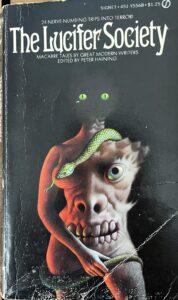 You may wonder why someone who recently wrapped up a 40-post series of fairly lengthy Lenten reflections is now reviewing a book entitled The Lucifer Society.
You may wonder why someone who recently wrapped up a 40-post series of fairly lengthy Lenten reflections is now reviewing a book entitled The Lucifer Society.
Well, be not confused. The title is not really descriptive of the contents, but that is the only shortcoming of this otherwise fabulous and fabulously unique anthology of macabre short stories edited by Peter Haining, released in 1972, and amazingly, out of print since 1973.
Haining’s concept for the anthology is absolutely brilliant: each tale of terror is written by a literary icon not known for his work in the genre. Some of the authors, in fact, never published another horror story in their entire careers. The anthology has two sections: English authors and American authors. The all-star lineup includes G. K. Chesterton, Agatha Christie, Somerset Maugham, Graham Greene, F. Scott Fitzgerald, William Faulkner, Raymond Chandler, and John Steinbeck. The book kicks off with a superb story by Winston Churchill — included not because Churchill is especially known as a literary figure, but because the story was Haining’s inspiration for assembling this collection.
I tracked down The Lucifer Society on Abe’s Books (a great company, by the way) for one reason only: I desperately wanted to reread The Cherries, by Lawrence Durrell. I read it long ago and never forgot it. The Cherries is by far the weirdest, most penetrating, and most chilling description of mental illness I have ever encountered, and as far as I can tell, can only be found in this now obscure anthology.
As you would expect, the other inclusions are top notch across the board. Some contain elements of the supernatural, but others do not; Churchill’s story, Man Overboard, which kicks off the proceedings, has no air of the supernatural about it at all — and it is precisely the stark realism of the situation that makes the protagonist’s plight so terrifying.
Not every story in this collection is wholly horrific, either. Raymond Chandler’s The Bronze Door, another one of my favorites, tells the tale of a mundane marriage made macabrely magical through a masterful mixture of irony, wit, fantasy, and science fiction. John Steinbeck’s The Affair at 7 Rue M— is the most out-and-out amusing story of the lot; the The Snail Watcher, by Patricia Highsmith (something of a horror story herself*), seems to me to deliver the best and most balanced blend of horror and humor. Chesterton’s The Angry Street has the most intriguing opening; A Man Who Had No Eyes, by MacKinlay Kantor, provides the best surprise ending; and Faulkner’s A Rose for Emily, probably the most well-known of these stories, has the thickest and saddest atmosphere.
Only the final two stories disappointed me: Exterminator, by William Burroughs, and During the Jurassic, by John Updike. Of course both are written with amazing skill, but Burroughs tries too hard to be gritty, and Updike too hard to be sophisticated. Some may enjoy such extremities of style, but to me stylistic oddities and excesses just get in the way of a good story.
Other than those minor misfires, this collection is well worth the time to track to down.
Complete List of Authors: The Lucifer Society
Sir Winston Churchill
John Galsworthy
G. K. Chesterton
Agatha Christie
Lawrence Durrell
Somerset Maugham
Robert Graves
J. B. Priestly
C. S. Forester
Graham Greene
Angus Wilson
Kingsley Amis
Sinclair Lewis
F. Scott Fitzgerald
Raymond Chandler
MacKinlay Kantor
John Steinbeck
Patricia Highsmith
Evan Hunter
Paul Gallico
Truman Capote
William Burroughs
John Updike
Further Reading
I must confess I’m not terribly well-read on most of these authors. Andersonville, MacKinlay Kantor’s masterpiece, should be required reading and is on my list of 33 Unforgettable Books. I, Claudius, by Robert Graves, also appears on that list; all of his historical fiction stands out. Churchill’s six-volume classic The Second World War, is an outstanding and detailed account of that conflict from the perspective of a man who was right in the middle of it.
G. K. Chesterton, a writer with whom I am very familiar, gives you an endless choice of illuminating essays, poems, fiction, and Christian apologetics from which to choose.
- * Patricia Highsmith was a novelist and short story writer with whom I was not familiar at all. Click here to learn more about her literary accomplishments and difficult life.
- 33 Unforgettable Books
